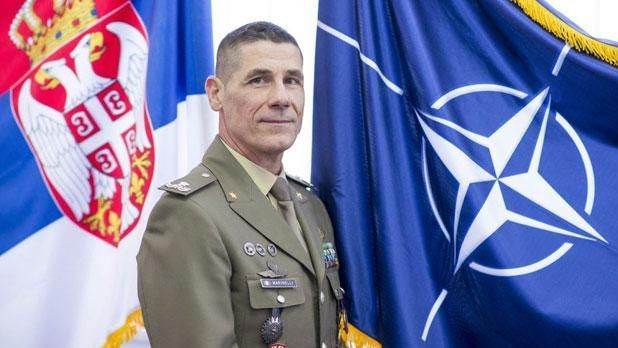
Serbia is becoming an increasingly important partner to NATO, Brigadier General Cesare Marinelli, Chief of the Alliance Military Liaison Office in Belgrade, tells the European Western Balkans (EWB) website in an interview published on Thursday.
The interview focused on cooperation between NATO and Serbia, key events that have shaped it in 2019, as well as new Individual Partnership Action Plan (IPAP), which was adopted last month, EWB said.
“This is my fourth year in Belgrade, and I am pleased to say that relations between Serbia and NATO are better than they seem to an average person, with Serbia becoming an even more important partner to NATO,” Marinelli said.
He added that “the partnership is strong and we continue to work together in areas where both Serbia and NATO see the benefits. I am glad that we can cooperate and exchange experiences through the Partnership for Peace programme, with Serbia being among more active countries, focused on training and capacity-building opportunities. We wish to build up a unique relationship, and Serbia is free to choose its own priorities for cooperation with NATO.”
Marinelli said he would remember 2019 for a number of joint activities, beneficial for both NATO and Serbia.
“Belgrade also welcomed a number of high-ranking NATO officials, proving its commitment to our partnership. Just several weeks ago in Bujanovac, NATO experts were thrilled with the knowledge and capabilities presented by the general-purpose engineering company of the Serbian Armed Forces, which has shown that it is fully prepared to participate in international peacekeeping missions in line with NATO standards,” he added.
Marinelli listed NATO support to the Army of Serbia (VS), including the Support and Procurement Agency and its Trust Fund, which helped to add new capacities at the Technical Overhaul Facility in Kragujevac, contributing to better safety there.
“Serbia is still free to choose from over 1,600 different activities to do together with NATO, and during this year it has opted for a number of training of its capable and devoted officers,” Marinelli said.
Asked about the 2019-2021 IPAP, NATO chief said he was satisfied with the effects of the previous and new IPAP.
“With the new IPAP, we underline the importance of this document, since it provides us with very good guidance as to how to take this partnership and cooperation forward so that it can benefit and meet the expectations of both Serbia and NATO. At the same time, we are very gratified to see that public diplomacy is one focus area of IPAP,” he said.
Marinelli reiterated NATO general view on Serbia’s neutrality.
“We have been continuously emphasising that NATO fully respects the Serbian stated policy of military neutrality. It is the sovereign prerogative of Serbia to choose whatever security arrangements it finds suitable for the need of its citizens. There is no conflict between having good relations with NATO and good and good relations with Russia or any other country or a multinational entity. Our partnerships are demand-driven. We do not impose anything on our partners and as you know, NATO works closely with numerous militarily neutral countries, such as Finland, Austria or Sweden, just to name a few,” the general said.
Regarding Belgrade’s purchase of Russian-made weapons, Marinelli described NATO’s position as being always very clear – “the choice of weaponry system is a national sovereign prerogative and this, of course, includes Serbia. I would like to stress once again, we fully respect Serbia’s and every other nation’s sovereign right to choose their own political and security arrangements.”
He added that NATO welcomed “the current level of our partnership, as we find it beneficial for both sides, and we look forward to opportunities for strengthening it further.”
Marinelli said that “Serbia benefits from a number of different programs offered through our partnership – from scientific cooperation to the training of Serbian armed forces for UN-led operations, to reforms of the national defence and security structures, to preparedness in dealing with natural emergencies.”




